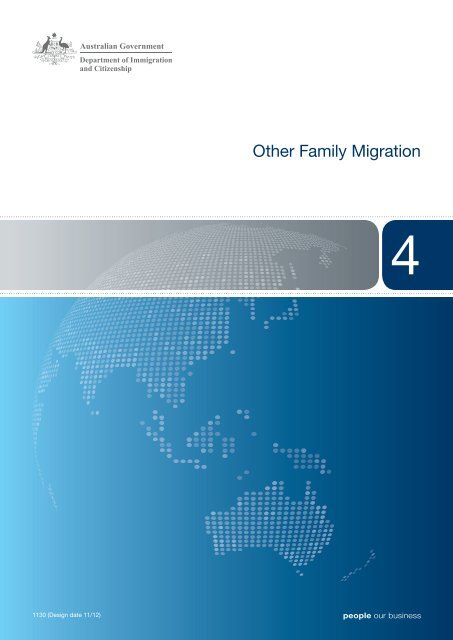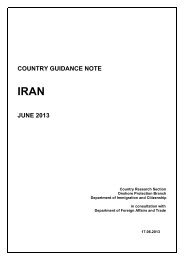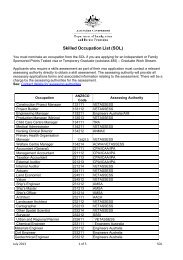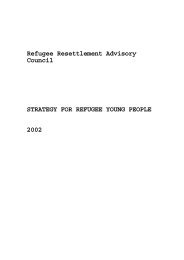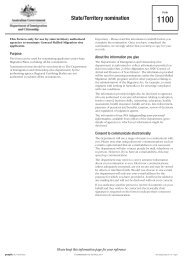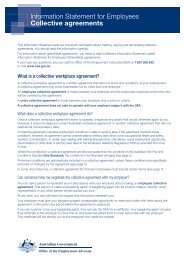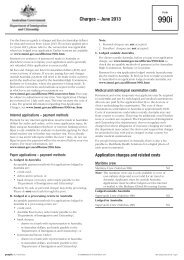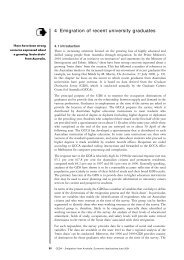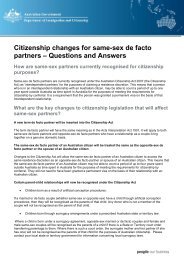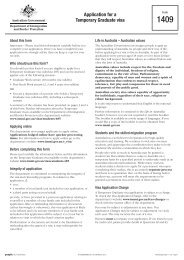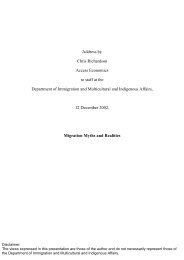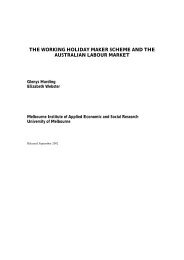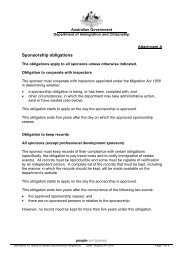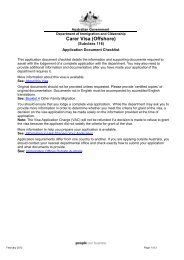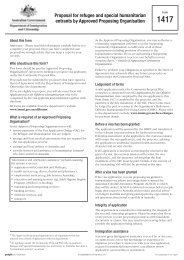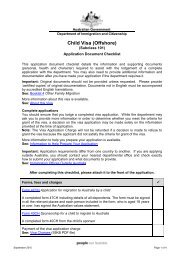Other Family Migration - Booklet 4 - Department of Immigration ...
Other Family Migration - Booklet 4 - Department of Immigration ...
Other Family Migration - Booklet 4 - Department of Immigration ...
Create successful ePaper yourself
Turn your PDF publications into a flip-book with our unique Google optimized e-Paper software.
1130 (Design date 11/12)<br />
<strong>Other</strong> <strong>Family</strong> <strong>Migration</strong><br />
4
About this booklet<br />
This booklet is designed to assist in understanding the steps for applying for <strong>Other</strong> <strong>Family</strong> <strong>Migration</strong> to<br />
Australia, and in how to complete the application form with minimal, if any, help.<br />
This booklet is one <strong>of</strong> a series <strong>of</strong> booklets about migration to Australia. The booklets are:<br />
1 Partner <strong>Migration</strong><br />
2 Child <strong>Migration</strong><br />
3 Parent <strong>Migration</strong><br />
4 <strong>Other</strong> <strong>Family</strong> <strong>Migration</strong><br />
5 Employer Sponsored <strong>Migration</strong><br />
6 General Skilled <strong>Migration</strong><br />
7 Business Skills <strong>Migration</strong><br />
8 Special <strong>Migration</strong><br />
For general information about migration to Australia, read information form 1126i Migrating to Australia,<br />
or visit the <strong>Department</strong> <strong>of</strong> <strong>Immigration</strong> and Citizenship (the department) website<br />
www.immi.gov.au/immigration/<br />
Using a migration agent<br />
You do not need to use a migration agent to lodge a visa application. However, if you choose to use an<br />
agent, the department recommends that you use a registered migration agent.<br />
Under Australian law, anyone who uses knowledge <strong>of</strong> migration procedures to <strong>of</strong>fer immigration<br />
assistance to a person wishing to obtain a visa to enter or remain in Australia must be registered or<br />
exempt from registration (see pages 26–27).<br />
All registered migration agents are bound by the <strong>Migration</strong> Agents Code <strong>of</strong> Conduct, which requires<br />
agents to act pr<strong>of</strong>essionally in their clients’ lawful best interests. A list <strong>of</strong> registered migration agents is<br />
available from the Offi ce <strong>of</strong> the <strong>Migration</strong> Agents Registration Authority (Offi ce <strong>of</strong> the MARA) website<br />
www.mara.gov.au<br />
You can contact the Offi ce <strong>of</strong> the MARA at:<br />
Website: www.mara.gov.au<br />
E-mail: info@mara.gov.au<br />
Mail: PO Box Q1551<br />
QVB NSW 1230<br />
AUSTRALIA<br />
In person: Level 8<br />
22 Market Street<br />
SYDNEY NSW<br />
AUSTRALIA<br />
Offi ce hours are 9am – 5pm Australian Eastern Standard Time (AEST)<br />
Telephone: 1300 226 272 or +61 2 9078 3552<br />
Fax: +61 2 9078 3591<br />
The Offi ce <strong>of</strong> the MARA investigates complaints against registered migration agents and may take<br />
disciplinary action against them. If you have a concern about a registered migration agent, you should<br />
contact the Offi ce <strong>of</strong> the MARA. The Code <strong>of</strong> Conduct and complaint form are available from the Offi ce <strong>of</strong><br />
the MARA website.
Contents<br />
Terms you need to know 2<br />
Part 1 – General information 5<br />
Basic requirements 5<br />
Sponsorship 6<br />
Assurance <strong>of</strong> Support 7<br />
Costs and charges 8<br />
Dependants 10<br />
Part 2 – Categories 12<br />
Aged dependent relative 12<br />
Remaining relative 14<br />
Carer 15<br />
Part 3 – Health and character 16<br />
Part 4 – Preparing your application 18<br />
Part 5 – Processing visa applications 22<br />
<strong>Other</strong> <strong>Family</strong> <strong>Migration</strong><br />
1
Part Terms X you – Chapter need to heading know<br />
Applicant The applicant is the person (or persons) applying to migrate or remain<br />
permanently in Australia.<br />
Australian mission An Australian Embassy, High Commission, Consulate or Consulate General or<br />
Australian Trade Commission that is located outside Australia<br />
Australian permanent A non-citizen, usually resident in Australia, who is the holder <strong>of</strong> a<br />
resident permanent visa.<br />
Child Child (when used in relation to another person) means:<br />
• a natural (biological) child; or<br />
• an adopted child within the meaning <strong>of</strong> the <strong>Migration</strong> Act 1958; or<br />
• a child conceived through an artifi cial conception procedure (ACP); or<br />
• a child born under surrogacy arrangements, where parentage has been<br />
transferred by court order under a prescribed state or territory law.<br />
De facto partner A person is the de facto partner <strong>of</strong> another person (whether <strong>of</strong> the same sex or<br />
a different sex) if the person is in a de facto relationship with the other person.<br />
De facto relationship For the purposes <strong>of</strong> a Child visa application, a person is in a de facto<br />
relationship with another person if:<br />
• they are not in a married relationship (for the purposes <strong>of</strong> the <strong>Migration</strong><br />
Act 1958) with each other;<br />
• they are not related by family;<br />
• they have a mutual commitment to a shared life to the exclusion <strong>of</strong> all<br />
others;<br />
• the relationship between them is genuine and continuing;<br />
• they live together or do not live separately and apart on a permanent basis;<br />
and<br />
• the relationship has continued for the period <strong>of</strong> 12 months immediately<br />
preceding the date <strong>of</strong> application.<br />
2 <strong>Other</strong> <strong>Family</strong> <strong>Migration</strong><br />
Note: The 12-month relationship requirement at time <strong>of</strong> application lodgement<br />
does not apply if the applicant can establish that there are compelling and<br />
compassionate circumstances for the grant <strong>of</strong> the visa.<br />
<strong>Department</strong> The <strong>Department</strong> <strong>of</strong> <strong>Immigration</strong> and Citizenship.<br />
Dependent child A child or step-child who has not turned 18 years <strong>of</strong> age, or, if aged 18 years<br />
or over, is a dependant. A dependent child must not have a spouse or de facto<br />
partner, or be engaged to be married.
Eligible New Zealand citizen An eligible New Zealand citizen is a person who at the time <strong>of</strong> last entry to<br />
Australia would have met health and character checks and:<br />
• held a Special Category (subclass 444) visa on 26 February 2001; or<br />
• held a Special Category (subclass 444) visa that was in force for at least<br />
one year in the 2 years before 26 February 2001; or<br />
• has a certifi cate, issued under the Social Security Act 1991, that states<br />
the citizen, for the purposes <strong>of</strong> the Social Security Act 1991, was residing<br />
in Australia on a particular date (note that Centrelink stopped accepting<br />
applications for these certifi cates in February 2004).<br />
Married relationship Persons are in a married relationship if:<br />
• they are married to each other under a marriage that is valid for the<br />
purposes <strong>of</strong> the <strong>Migration</strong> Act 1958;<br />
• they have a mutual commitment to a shared life as husband and wife to the<br />
exclusion <strong>of</strong> all others;<br />
• the relationship between them is genuine and continuing; and<br />
• they live together or do not live separately and apart on a permanent basis.<br />
Member <strong>of</strong> the family unit A person is a member <strong>of</strong> the family unit <strong>of</strong> another person (the family head) if<br />
the person is:<br />
• a spouse or de facto partner <strong>of</strong> the family head; or<br />
• a dependent child <strong>of</strong> the family head or <strong>of</strong> a spouse or<br />
de facto partner <strong>of</strong> the family head; or<br />
• a dependent child <strong>of</strong> a dependent child <strong>of</strong> the family head or <strong>of</strong> a spouse or<br />
de facto partner <strong>of</strong> the family head; or<br />
• a relative <strong>of</strong> the family head, or <strong>of</strong> a spouse or de facto partner <strong>of</strong> the family<br />
head, who:<br />
– is not in a married relationship or de facto relationship; and<br />
– is usually resident in the family head’s household (see page 4); and<br />
– is dependent on the family head.<br />
Information on the meaning <strong>of</strong> dependent is given at page 10.<br />
Migrate If you apply from outside Australia, you will be applying to migrate. If you are<br />
applying in Australia, you will be applying for permanent residence. In this<br />
booklet the term ‘migrate’ will cover both.<br />
Near relative A person who is your (or your partner’s) parent, brother, sister, adult child or<br />
non-dependent minor child (or step equivalents <strong>of</strong> these relationships).<br />
Non-dependent minor child A child who has not turned 18 and is not wholly or substantially in the daily<br />
care and control <strong>of</strong> the applicant or <strong>of</strong> the applicant’s spouse.<br />
Offi ce <strong>of</strong> the department A regional <strong>of</strong>fi ce <strong>of</strong> the <strong>Department</strong> <strong>of</strong> <strong>Immigration</strong> and Citizenship in Australia.<br />
Partner A spouse or de facto partner.<br />
<strong>Other</strong> <strong>Family</strong> <strong>Migration</strong><br />
3
Part X – Chapter heading<br />
Relative Relative (in relation to the defi nition <strong>of</strong> Member <strong>of</strong> the family unit) means your<br />
partner, child, parent, brother, sister, step-child, step-parent, step-sister or<br />
step-brother, grand-parent, grand-child, aunt, uncle, niece, nephew,<br />
step-grandparent, step-grandchild, step-aunt, step-uncle, step-niece or<br />
step-nephew.<br />
Settled Lawfully resident in Australia for a reasonable period. In normal circumstances,<br />
2 years is considered to be a reasonable period. For Australian citizens this<br />
period may be reduced to at least 3 months.<br />
Sponsor The sponsor is generally the Australian relative who undertakes sponsorship<br />
obligations for an applicant migrating from overseas, or applying for permanent<br />
residence in Australia.<br />
Spouse A person is the spouse <strong>of</strong> another person if they are in a married relationship.<br />
Usually resident The place that a person is ‘usually resident’ is decided taking into account their<br />
physical residence (ie. where the person eats, sleeps, has a home) and the<br />
person’s intention to make that place their home.<br />
4 <strong>Other</strong> <strong>Family</strong> <strong>Migration</strong>
Part 1 – General information<br />
Basic requirements<br />
For migration to Australia in the other family categories (aged dependent relative, remaining relative or<br />
carer), the following basic requirements must be met.<br />
Aged dependent relative<br />
You must be a single, widowed, divorced or formally separated aged person who is dependent on a<br />
relative who lives in Australia.<br />
Your relative must be an Australian citizen, Australian permanent resident or eligible New Zealand citizen.<br />
You must have been dependent on the relative for at least 3 years before your application.<br />
You can apply outside Australia or in Australia.<br />
Your relative or their partner (if any) must sponsor you. Your sponsor must be aged 18 years or older.<br />
An Assurance <strong>of</strong> Support is also required (see page 7).<br />
More details about the aged dependent relative category appear on page 12.<br />
Remaining relative<br />
Carer<br />
You must be the brother, sister or child (or step-relative to the same degree) <strong>of</strong> an Australian citizen,<br />
Australian permanent resident or eligible New Zealand citizen.<br />
You must have no near relatives other than those who are usually resident in Australia and are Australian<br />
citizens, Australian permanent residents, or eligible New Zealand citizens. The terms ‘Australian<br />
permanent resident’, ‘near relative’, ‘eligible New Zealand citizen’, ‘sponsor’ and ‘usually resident’ are<br />
defi ned on pages 2–4.<br />
You can apply outside Australia or in Australia.<br />
Your relative or their partner (if any) must sponsor you. Your sponsor must be aged 18 years or older.<br />
Please note that there are limitations on sponsorship that apply to the remaining relative category (see<br />
page 7).<br />
An Assurance <strong>of</strong> Support is also required (see page 7).<br />
More details about the remaining relative category appear on page 14.<br />
You must be willing and able to give substantial, continuing assistance to an Australian relative (or a<br />
member <strong>of</strong> their family unit) who has a medical condition that is causing physical, intellectual or sensory<br />
impairment <strong>of</strong> their ability to attend to the practical aspects <strong>of</strong> daily life. The need for assistance must be<br />
likely to continue for at least 2 years.<br />
Your relative must be an Australian citizen, Australian permanent resident or eligible New Zealand citizen.<br />
You can apply outside Australia or in Australia.<br />
Your relative (as referred to in paragraph one above) or their partner (if any) must sponsor you. Your<br />
sponsor must be aged 18 years or over.<br />
More details about the carer category appear on page 15.<br />
<strong>Other</strong> <strong>Family</strong> <strong>Migration</strong><br />
5
Part X – Chapter heading<br />
Processing priorities<br />
Sponsorship<br />
What is sponsorship?<br />
6 <strong>Other</strong> <strong>Family</strong> <strong>Migration</strong><br />
Under Australia’s family reunion migration program, a high priority is given to child and partner<br />
applications.<br />
<strong>Other</strong> family applications have a lower processing priority, and you should expect a substantial wait<br />
before your application is fi nalised.<br />
In the other family categories, carer is given priority over aged dependent relative and remaining relative.<br />
For further information, contact an Australian mission or an <strong>of</strong>fi ce <strong>of</strong> the department, or visit the<br />
department’s website www.immi.gov.au/migrants/<br />
It is in your interest to provide all the documents requested with your valid application.<br />
Failure to do so may result in the processing <strong>of</strong> your application being delayed, or a decision<br />
being made to refuse to grant the visa.<br />
Sponsorship is a written undertaking to provide support for you and your dependants during your fi rst<br />
2 years in Australia if you apply outside Australia, or the 2 years following grant <strong>of</strong> your visa if you apply<br />
in Australia, including accommodation and fi nancial assistance as required to meet you and your family’s<br />
reasonable living needs.<br />
Who can sponsor?<br />
Your sponsor must be the relative specifi ed for each category <strong>of</strong> visa, aged 18 years or over and an<br />
Australian citizen, Australian permanent resident or an eligible New Zealand citizen.<br />
Instead <strong>of</strong> being sponsored by your relative, you may be sponsored by your relative’s cohabiting partner if<br />
they are aged 18 years or over and are an Australian citizen, Australian permanent resident or eligible New<br />
Zealand citizen. Sponsors must also be usually resident and settled in Australia.<br />
Note: An eligible New Zealand citizen sponsor must meet health and character criteria (see page 16).<br />
Sponsorship form<br />
Your sponsor must complete a sponsorship form. A copy <strong>of</strong> the appropriate form (form 40 Sponsorship<br />
for migration to Australia) is provided with this booklet. This form must be completed and signed by your<br />
sponsor.<br />
Your sponsor should include the following with the sponsorship form:<br />
• evidence <strong>of</strong> their relationship with you; and<br />
• evidence that they are either an Australian citizen, permanent resident or eligible New Zealand citizen.<br />
The form should be lodged with your application.
A sponsorship form is valid for 2 years from the time it is signed by your sponsor.<br />
If there are delays in processing your application, your sponsor may need to complete a new form.<br />
If you have applied for a Remaining Relative visa, you are able to change your sponsor before your visa<br />
application is fi nally determined.<br />
Sponsorship limitations in the Remaining Relative category<br />
There are limitations that apply to sponsors in the Remaining Relative category.<br />
An application to migrate or remain permanently in Australia as a remaining relative <strong>of</strong> an Australian<br />
citizen, Australian permanent resident or eligible New Zealand citizen cannot be approved if:<br />
• the Australian relative was previously granted a Preferential <strong>Family</strong> (subclass 104) visa, <strong>Family</strong><br />
(subclass 806) visa, Remaining Relative (subclass 115) visa or Remaining Relative (subclass 835)<br />
visa; or<br />
• the Australian relative or their partner on their behalf, sponsored/nominated another person who<br />
was granted a Preferential <strong>Family</strong> (subclass 104) visa, <strong>Family</strong> (subclass 806) visa, Remaining Relative<br />
(subclass 115) visa or Remaining Relative (subclass 835) visa on the basis <strong>of</strong> that sponsorship/<br />
nomination.<br />
Assurance <strong>of</strong> Support<br />
What is an Assurance <strong>of</strong> Support?<br />
An Assurance <strong>of</strong> Support is a commitment to provide fi nancial support to the person applying to migrate<br />
so that the migrant will not have to rely on any government forms <strong>of</strong> support.<br />
It is also a legal commitment by a person to repay the Australian Government any recoverable social<br />
security payments made by Centrelink to those covered by the assurance. The assurance is in force for<br />
2 years from the assuree’s arrival in Australia, or for those applying in Australia, the date <strong>of</strong> visa grant.<br />
Assurances cover the main applicant and any dependants included in the application.<br />
When is an Assurance <strong>of</strong> Support required?<br />
Applicants for aged dependent relative and remaining relative visas require an Assurance <strong>of</strong> Support.<br />
You should not lodge an Assurance <strong>of</strong> Support application until asked to do so by the department.<br />
You should not pay the assurance bond until asked to do so by Centrelink.<br />
<strong>Other</strong> <strong>Family</strong> <strong>Migration</strong><br />
7
Part X – Chapter heading<br />
Who can give an Assurance <strong>of</strong> Support?<br />
8 <strong>Other</strong> <strong>Family</strong> <strong>Migration</strong><br />
Your sponsor does not have to be your assurer. You can also have joint assurers.<br />
The person giving an Assurance <strong>of</strong> Support must be:<br />
• an Australian citizen, Australian permanent resident or eligible New Zealand citizen aged 18 years or<br />
over;<br />
• usually resident in Australia; and<br />
• fi nancially able to support the sponsored person or persons and repay certain social security<br />
payments should they be made to the person(s) covered by the assurance.<br />
It is unlikely that a person could provide an acceptable Assurance <strong>of</strong> Support if they have received the full<br />
rate <strong>of</strong> any pensions, benefi ts or allowances (other than family payments) from Centrelink during the past<br />
year.<br />
Assurances <strong>of</strong> support may also be provided by some organisations.<br />
Giving an Assurance <strong>of</strong> Support<br />
Centrelink has responsibility for assessing all Assurance <strong>of</strong> Support applications. Where appropriate, this<br />
also includes managing bond lodgement. For more information about the Assurance <strong>of</strong> Support scheme,<br />
including application procedures refer to Centrelink’s website www.centrelink.gov.au or contact Centrelink<br />
on 132 850 from within Australia or 61 3 6222 3455 from outside Australia. See also, Fact sheet 34<br />
available from www.immi.gov.au/media/fact-sheets/<br />
Costs and charges<br />
Listed below are some <strong>of</strong> the costs and charges which you should fi nd out about before applying.<br />
Visa Application Charge<br />
The Visa Application Charge (VAC) is payable in 2 instalments. The fi rst instalment must accompany your<br />
application and covers all members <strong>of</strong> your family unit included in the application.<br />
The fi rst instalment is generally not refunded if your application is unsuccessful.<br />
Before your visa is granted, you must pay a second instalment <strong>of</strong> the VAC for yourself and each other<br />
person included in the application.<br />
Payment <strong>of</strong> the 2nd VAC is not required until after all legal requirements have been satisfi ed for the grant<br />
<strong>of</strong> the visa for which you applied. The charge must not be paid until after the department sends you a<br />
letter requesting its payment.<br />
Note for carers only: The department may waive payment <strong>of</strong> the second instalment <strong>of</strong> the VAC if<br />
payment will cause severe fi nancial hardship to the applicant or the person requiring care.<br />
A VAC may be subject to adjustment at any time. This may increase the cost <strong>of</strong> a visa.<br />
To check the VAC amount, see form 990i Charges available from the department’s website<br />
www.immi.gov.au/allforms/990i.htm or check with the nearest <strong>of</strong>fi ce <strong>of</strong> the department.
Method <strong>of</strong> payment<br />
In Australia<br />
To make a payment, please pay by credit card, debit card, bank cheque or money order made payable to<br />
the <strong>Department</strong> <strong>of</strong> <strong>Immigration</strong> and Citizenship. Debit card and credit card are the preferred methods <strong>of</strong><br />
payment.<br />
Outside Australia<br />
Before making a payment outside Australia, please check with the Australian Government <strong>of</strong>fi ce where<br />
you intend to lodge your application as to what methods <strong>of</strong> payment and currencies they can accept and<br />
to whom the payment should be made payable.<br />
Medical costs<br />
You and members <strong>of</strong> your family unit will be required to pay for a medical examination. The cost <strong>of</strong> the<br />
examination is a matter between you and the doctor undertaking the examination.<br />
Note for carers only: An additional fee is directly payable to Medibank Health Solutions for a medical<br />
assessment <strong>of</strong> the person requiring care.<br />
Assurance <strong>of</strong> Support bond<br />
Persons providing an Assurance <strong>of</strong> Support are required to lodge a refundable bond.<br />
<strong>Other</strong> costs<br />
You should be prepared to pay other costs associated with your application, such as those required<br />
to obtain a character clearance from overseas authorities, or the cost <strong>of</strong> certifi ed translations <strong>of</strong> some<br />
documents.<br />
<strong>Other</strong> <strong>Family</strong> <strong>Migration</strong><br />
9
Part X – Chapter heading<br />
Dependants<br />
10 <strong>Other</strong> <strong>Family</strong> <strong>Migration</strong><br />
Your application may cover a family unit, namely a main applicant and, if applicable, partner and<br />
dependants.<br />
An application for an <strong>Other</strong> <strong>Family</strong> (Migrant) (Class BO) visa must be lodged outside Australia. All<br />
members <strong>of</strong> the family unit included in the application must be outside Australia when the visa is granted.<br />
An application for an <strong>Other</strong> <strong>Family</strong> (Residence) (Class BU) visa must be lodged in Australia. All members<br />
<strong>of</strong> the family unit included in the application must be in Australia when the application is lodged and when<br />
the visa is granted.<br />
Dependent children<br />
A dependent child may be your child or a step child. ‘Step-child’ means a child <strong>of</strong> your current partner or<br />
a child <strong>of</strong> your former partner where the child is under 18 years <strong>of</strong> age and you have a legal responsibility<br />
to care for the child (for example, where your former partner is deceased and you have legal custody <strong>of</strong><br />
the child). You will need to provide a certifi ed copy <strong>of</strong> the overseas or Australian court order which you<br />
have in relation to the child.<br />
A child <strong>of</strong> any age is not considered dependent if they are married or in a de facto relationship or are<br />
engaged to be married.<br />
A child 18 years <strong>of</strong> age or over will not be considered dependent unless you can show that they are<br />
wholly or substantially reliant on you for fi nancial support for their basic needs <strong>of</strong> food, shelter and<br />
clothing. You must also show that you have provided that support for a substantial period and that the<br />
child is more reliant on you than on any other person or source. Unless you can provide evidence <strong>of</strong> this,<br />
they should apply separately. You should also be aware that a child 25 years <strong>of</strong> age or over will generally<br />
not be considered dependent.<br />
Children <strong>of</strong> any age who have a total or partial loss <strong>of</strong> bodily or mental functions which stops them<br />
earning a living are regarded as dependent and part <strong>of</strong> the family unit (whether or not they migrate with<br />
you). Give details <strong>of</strong> such children whether they are in your care or in an institution.<br />
In all cases you should attach evidence <strong>of</strong> your child’s dependency on you.<br />
<strong>Other</strong> dependants<br />
You may include other relatives in your application if they are wholly or substantially reliant on you for<br />
fi nancial support for their basic needs <strong>of</strong> food, shelter and clothing and they have been reliant on you for<br />
that support for a substantial period. They must also be more reliant on you for support than on any other<br />
person or source.<br />
A relative may also be considered dependent on you if they are reliant on you for fi nancial support<br />
because they have a mental or physical disability which stops them from earning a living to support<br />
themselves.<br />
<strong>Other</strong> relatives dependent on you or your spouse may include, for example, an aged, unmarried relative.<br />
If you have dependants who are 18 years <strong>of</strong> age or over, please obtain form 47A Details <strong>of</strong> child<br />
or other dependent family member aged 18 years or over. A form 47A must be completed for<br />
each dependant aged 18 years or over, whether they are migrating or not.
Part 2 – Chapter heading<br />
Custody requirement<br />
The department will seek to ensure that allowing a child to migrate is not in contravention <strong>of</strong> Australia’s<br />
international obligations in relation to the prevention <strong>of</strong> child abduction. If your application includes a<br />
child under 18 years <strong>of</strong> age and the child’s other parent is not migrating with you or there is any other<br />
person who has the legal right to determine where the child can live, you will need to provide a Statutory<br />
Declaration from each <strong>of</strong> them giving permission for the child to migrate. Alternatively, you can provide a<br />
certifi ed copy <strong>of</strong> a valid court order showing that you/your spouse has the legal right to remove the child<br />
from the country.<br />
<strong>Other</strong> <strong>Family</strong> <strong>Migration</strong><br />
11
Part X 2 – Categories Chapter heading<br />
Aged dependent relative<br />
Age<br />
12 <strong>Other</strong> <strong>Family</strong> <strong>Migration</strong><br />
An aged dependent relative is a person who:<br />
• is old enough to be granted an age pension under the Social Security Act 1991; and<br />
• is not in a married relationship or a de facto relationship; and<br />
• has been dependent, and remains dependent on the Australian relative for a reasonable period<br />
(normally 3 years).<br />
Your relative must be an Australian citizen, Australian permanent resident or eligible New Zealand citizen.<br />
You will meet the age requirement if you are eligible to be granted an age pension under the Social<br />
Security Act 1991. Men qualify for an age pension at age 65 years or over. For women, it depends on<br />
their date <strong>of</strong> birth. The minimum age for women to get an age pension began to increase from 1 July<br />
1995. It will continue to increase until it reaches 65 by 2014, making it the same for everyone. Until then,<br />
a woman’s qualifying age depends on her date <strong>of</strong> birth.<br />
Qualifying ages for Australian age pension<br />
For men – the qualifying age is 65 years.<br />
For women – the qualifying age for women depends on their date <strong>of</strong> birth (see below)<br />
Date <strong>of</strong> birth Qualifi cation age<br />
(at time <strong>of</strong> application)<br />
Before 1 July 1935 60<br />
1 July 1935 – 31 December 1936 60.5<br />
1 January 1937 – 30 June 1938 61<br />
1 July 1938 – 31 December 1939 61.5<br />
1 January 1940 – 30 June 1941 62<br />
1 July 1941 – 31 December 1942 62.5<br />
1 January 1943 – 30 June 1944 63<br />
1 July 1944 – 31 December 1945 63.5<br />
1 January 1946 – 30 June 1947 64<br />
1 July 1947 – 31 December 1948 64.5<br />
1 January 1949 and later 65
Relationship status<br />
You must demonstrate that you do not have a partner (spouse or de facto partner). To establish your<br />
current relationship status, you should provide <strong>of</strong>fi cial documents such as death certifi cate <strong>of</strong> your<br />
previous partner, divorce certifi cate, family status certifi cates or family books (if these documents are<br />
<strong>of</strong>fi cially issued and maintained).<br />
Relationship to you<br />
Your relative in Australia must be a close relative, that is: a child, parent, brother or sister, grandchild,<br />
uncle, aunt, niece or nephew (or step-relatives <strong>of</strong> the same degree).<br />
So that the line <strong>of</strong> relationship to your relative can be clearly traced, you should provide <strong>of</strong>fi cial documents<br />
such as birth certifi cates (showing full names <strong>of</strong> parents), marriage certifi cates, death certifi cates,<br />
adoption certifi cates, family status certifi cates or family books (if these documents are <strong>of</strong>fi cially issued and<br />
maintained).<br />
Dependent<br />
You must demonstrate that you are wholly or substantially dependent on your Australian relative for<br />
fi nancial support for basic needs <strong>of</strong> food, shelter and clothing, or because you have a disability which<br />
prevents you from working, and that the support has been provided for a reasonable period (normally<br />
3 years).<br />
If you are claiming fi nancial dependency, documented evidence <strong>of</strong> the transfer <strong>of</strong> funds on a regular basis<br />
over a reasonable period will need to be provided to support your claim.<br />
<strong>Other</strong> <strong>Family</strong> <strong>Migration</strong><br />
13
Part X – Chapter heading<br />
Remaining relative<br />
14 <strong>Other</strong> <strong>Family</strong> <strong>Migration</strong><br />
This category is designed to enable Australian citizens, Australian permanent residents or eligible New<br />
Zealand citizens, (who are usually resident and settled in Australia), to sponsor a remaining relative to<br />
migrate to Australia.<br />
You are a remaining relative if:<br />
• you are the brother, sister, child (or step equivalent) <strong>of</strong> a person who is settled and usually resident in<br />
Australia, and is an Australian citizen, Australian permanent resident or eligible New Zealand citizen;<br />
and<br />
• that person, or their partner (if any), is aged 18 years or over and is sponsoring you; and<br />
• your sponsor is not subject to the sponsorship limitations outlined at page 7; and<br />
• if you are a child under 18 years <strong>of</strong> age, who was adopted overseas by an Australian citizen,<br />
Australian permanent resident or eligible New Zealand citizen, your adoptive parent had spent the<br />
required 12 months living overseas prior to visa application; and<br />
• you and your partner do not have any near relatives other than those who are usually resident in<br />
Australia and are Australian citizens, Australian permanent residents or eligible New Zealand citizens.<br />
A near relative (see ‘Terms you need to know’ on pages 3–4) is a person who is your (or your<br />
partner’s) parent, brother, sister, adult child or non-dependent minor child (or step equivalents <strong>of</strong> these<br />
relationships).<br />
If you have any near relative (other than those who are usually resident in Australia and are an Australian<br />
citizen, Australian permanent resident or an eligible New Zealand citizen) you are not eligible for a<br />
remaining relative visa. If you have any near relative who holds a temporary entry visa for Australia you are<br />
not eligible for a remaining relative visa.<br />
Your application must include information about all near relatives <strong>of</strong> yourself and your partner, including<br />
whether or not each <strong>of</strong> those near relatives holds Australian citizenship or Australian permanent residence<br />
status or is an eligible New Zealand citizen.<br />
If any near relatives <strong>of</strong> yourself or your partner are deceased, you may be required to provide<br />
documentary evidence.
Carer<br />
You must be willing and able to give substantial, continuing assistance to an Australian relative. That<br />
Australian relative’s need for assistance must exist because either:<br />
• they have a long-term or permanent medical condition that is causing physical, intellectual or sensory<br />
impairment <strong>of</strong> their ability to attend to the practical aspects <strong>of</strong> daily life; or<br />
• they require practical support to help them care for a member <strong>of</strong> their family unit (see ‘Terms you<br />
need to know’ on pages 3 –4) in their household with such a medical condition.<br />
You need to fully understand the nature <strong>of</strong> the assistance required by the Australian relative.<br />
The type <strong>of</strong> assistance you provide must be <strong>of</strong> a type which cannot reasonably be provided by any other<br />
relative or obtained from welfare, hospital, nursing or community services in Australia.<br />
The need for assistance must be likely to continue for at least 2 years.<br />
Your relative must:<br />
• be your partner, child, parent, brother, sister, step-child, step-parent, step-sister or step-brother,<br />
grand-parent, grand-child, aunt, uncle, niece, nephew, step-grandparent, step-grandchild, stepaunt,<br />
step-uncle, step-niece or step-nephew; and<br />
• be an Australian citizen or a Australian permanent resident or an eligible New Zealand citizen; and<br />
• usually reside in Australia.<br />
Medical assessment <strong>of</strong> the person needing care<br />
The person with the medical condition may be your relative or a member <strong>of</strong> your relative’s family unit. That<br />
person must be an Australian citizen, Australian permanent resident or eligible New Zealand citizen and<br />
be medically assessed by Medibank Health Solutions.<br />
To arrange their appointment with Medibank Health Solutions, your relative can telephone 1300 361 046<br />
from anywhere in Australia for the cost <strong>of</strong> a local call.<br />
When your relative speaks to the Medibank Health Solutions <strong>of</strong>fi ce, they must mention that the medical<br />
examination is in relation to a Carer visa.<br />
After Medibank Health Solutions has made an assessment <strong>of</strong> your relative, it will provide a certifi cate that<br />
will:<br />
• include a score based on the Tables <strong>of</strong> Impairment currently used by Centrelink to assess eligibility<br />
for payment <strong>of</strong> the Disability Support Pension;<br />
• state whether your relative has a medical condition that will affect their ability to attend to their needs<br />
(such as eating, dressing, hygiene and mobility, but not everyday domestic tasks such as shopping,<br />
gardening and housekeeping) for at least the next 2 years; and<br />
• include an assessment <strong>of</strong> the type <strong>of</strong> assistance required to manage those needs.<br />
Your application cannot be accepted unless you provide evidence that an examination by<br />
Medibank Health Solutions has been sought.<br />
You will be advised by the Overseas Mission/Regional Offi ce <strong>of</strong> further processing<br />
requirements.<br />
<strong>Other</strong> <strong>Family</strong> <strong>Migration</strong><br />
15
Part X 3 – Health Chapter and heading character<br />
Health<br />
Health standards<br />
16 <strong>Other</strong> <strong>Family</strong> <strong>Migration</strong><br />
You and all dependent family members must meet strict health standards designed to protect Australia<br />
from high health risks and costs, and overuse <strong>of</strong> health resources such as organs for transplant.<br />
Medical examination<br />
You will be asked to undertake an examination by a doctor, selected by Australian authorities. Usually, a<br />
chest x-ray, medical examination and possibly some laboratory or specialist tests and referral to Medical<br />
Offi cers <strong>of</strong> the Commonwealth for fi nal decision will be required. This can be a lengthy process and<br />
costs will be your responsibility. All members <strong>of</strong> your immediate family must meet the standards for your<br />
application to be successful. Dependants who are not planning to migrate must also be examined.<br />
Forms for your medical examination, together with directions to listed doctors, will be provided by staff<br />
processing your migration application. If you are pregnant, you are advised not to be x-rayed until after<br />
the birth <strong>of</strong> your baby, meaning that your application may not be fi nished until then. Alternatively, although<br />
not preferred by the Australian Government, you may care to discuss with your radiologist the use <strong>of</strong> a<br />
lead shielded x-ray.<br />
Health conditions <strong>of</strong> concern<br />
In view <strong>of</strong> the World Health Organisation’s declaration <strong>of</strong> a global epidemic <strong>of</strong> tuberculosis, particular care<br />
is taken to screen for this disease including stringent treatment recommendations where signs <strong>of</strong> earlier<br />
infection, however small or old, are apparent.<br />
Australia has one <strong>of</strong> the lowest rates <strong>of</strong> tuberculosis in the world and maintains one <strong>of</strong> the strictest<br />
regimes for screening and treatment. Detection <strong>of</strong> the disease will not lead to automatic rejection, but<br />
your application may only continue after recommended treatment and successful retesting.<br />
<strong>Other</strong> health conditions <strong>of</strong> concern are those where a person is assessed by Australian authorities as<br />
requiring treatment, support or assistance which are considered to be in short supply, or which cost a<br />
signifi cant amount. This may differ from treatments in other countries.<br />
The department is authorised to collect information on this form under the <strong>Migration</strong> Act 1958. The<br />
information on this form, including the results <strong>of</strong> tests for Human Immunodefi ciency Virus (HIV), will be<br />
used to assess your health for an Australian visa. A positive HIV or other test result will not necessarily<br />
lead to a visa being denied but it may mean that your result(s) will be disclosed to the relevant<br />
Commonwealth and state/territory health agencies.<br />
Doctors<br />
Doctors may charge you fees in accordance with their usual practice. They may recommend that you<br />
undertake other treatment or specialist consultations. This may be in your own interest because listed<br />
doctors know what is required for the assessment <strong>of</strong> your examination results in Australia. Doctors must<br />
complete the examination form in English.
Basis for decision<br />
A decision is made on, fi rst, any detection <strong>of</strong> tuberculosis, however old or small, and then, <strong>of</strong> medical<br />
conditions which are likely to result in signifi cant health treatment and community services costs in<br />
Australia, or which may use treatment or services in short supply. Some allowance is made for normal<br />
health charges (calculated as a multiple <strong>of</strong> average annual costs for an Australian). When the Medical<br />
Offi cer <strong>of</strong> the Commonwealth is <strong>of</strong> the opinion that an applicant’s costs are beyond these and are<br />
therefore signifi cant, this generally leads to refusal. The cost assessment takes no regard <strong>of</strong> whether a<br />
person has or intends to take private health insurance or make other fi nancial arrangements to lessen a<br />
claim on public funds.<br />
It is not the doctor who examines you who determines whether you meet the health requirement, but<br />
Australian authorities.<br />
There is no waiver <strong>of</strong> the health requirements for applicants in the other family categories<br />
(aged dependent relative, remaining relative or carer).<br />
Character<br />
To enter Australia, applicants must be <strong>of</strong> good character.<br />
In order for the Australian Government to determine whether you are <strong>of</strong> good character, you may be<br />
asked to provide police certifi cates for each country you have resided in for 12 months or more over the<br />
last 10 years. In some instances, applicants may also be required to provide personal details to enable<br />
additional character checks to be undertaken.<br />
You do not have to provide this information when you apply. You will be advised when it is required.<br />
<strong>Other</strong> <strong>Family</strong> <strong>Migration</strong><br />
17
Part X 4 – Preparing Chapter heading your application<br />
Forms<br />
18 <strong>Other</strong> <strong>Family</strong> <strong>Migration</strong><br />
Provide completed forms:<br />
form 47OF Application for migration to Australia by other family members;<br />
form 40 Sponsorship for migration to Australia;<br />
if you are using a registered migration agent, a non-registered migration agent outside Australia, or an<br />
exempt person, form 956 Advice by a migration agent/exempt person <strong>of</strong> providing immigration<br />
assistance;<br />
if you are appointing an authorised recipient or withdrawing the appointment <strong>of</strong> your authorised<br />
recipient, form 956A Appointment or withdrawal <strong>of</strong> an authorised recipient.<br />
Forms are subject to change, ensure the forms used remain valid at time <strong>of</strong> application.<br />
Note: <strong>Other</strong> forms may be required and will be provided by the department at the appropriate time.<br />
Application charge<br />
Charges are listed in form 990i Charges which is available from the department’s website<br />
www.immi.gov.au/allforms/<br />
<strong>Other</strong> documents<br />
<strong>Other</strong> documents you must provide<br />
<strong>Other</strong> documents you must provide are listed on pages 19–20.<br />
You should provide all the documents necessary to support your claims to eligibility when you make your<br />
application.<br />
If you cannot provide all the documents when you make your application, you should tell the department<br />
which documents are missing and when you expect to be able to provide them.<br />
If you do not provide all the necessary documents a decision may be made on the information you have<br />
provided. It is in your interests to support your application with as much information as possible at the<br />
time <strong>of</strong> application.<br />
Certifi ed copies<br />
Do not supply original documents with your application. If we require an original document at any stage,<br />
we will ask for it.<br />
You should provide ‘certifi ed copies’ <strong>of</strong> original documents. This means a copy which is authorised as<br />
a true copy by a person before whom a Statutory Declaration may be made. Such authorised persons<br />
include the following: a magistrate, Justice <strong>of</strong> the Peace, Commissioner for Declarations, Commissioner<br />
for Affi davits, a person before whom a Statutory Declaration may be made under the law <strong>of</strong> the state in<br />
which the Declaration is made, a solicitor, registered medical practitioner, bank manager, postal manager,<br />
Australian Postal Corporation Offi cer with 5 years service.
English translations<br />
Documents in languages other than English must be accompanied by an English translation. If you<br />
are applying in Australia, the translator must be accredited by the National Accreditation Authority for<br />
Translators and Interpreters (NAATI). If you are overseas, you should ask at your nearest Australian<br />
mission for further information about how to get your documents translated.<br />
If you are applying outside Australia, please contact the nearest Australian mission for information about<br />
how to get your documents translated.<br />
You must provide the following documents with your completed<br />
application form<br />
We suggest you check <strong>of</strong>f each <strong>of</strong> the following documents as you attach it to your application to ensure<br />
that you include all necessary documents.<br />
If you are applying in Australia, certifi ed copies <strong>of</strong> the passports or travel documents you and your<br />
dependents used to enter Australia, and <strong>of</strong> any passports held since then.<br />
Documents to prove your identity – a certifi ed copy <strong>of</strong> your birth registration showing both parents’<br />
names. If you do not have a birth certifi cate or are unable to get one, you must provide a certifi ed copy<br />
<strong>of</strong> the identifi cation pages <strong>of</strong> at least one <strong>of</strong> the following documents:<br />
• passport;<br />
• family book showing both parents’ names;<br />
• identifi cation document issued by the government; or<br />
• document issued by a court that verifi es your identity.<br />
If you are unable to provide one <strong>of</strong> these documents, you must provide other acceptable evidence that<br />
you are who you claim to be.<br />
4 recent passport sized photographs (45mm x 35mm) <strong>of</strong> yourself and any other person included in the<br />
application. These should be <strong>of</strong> the head and shoulders only, and should show the person facing the<br />
camera and against a plain background. You should print the name <strong>of</strong> the person on the back <strong>of</strong> each<br />
photograph.<br />
If you or anyone included in the application is or has been married, certifi ed copies <strong>of</strong> the marriage<br />
certifi cate(s).<br />
If anyone included in the application has been divorced or widowed, a certifi ed copy <strong>of</strong> the divorce<br />
decree absolute or the death certifi cate <strong>of</strong> the deceased partner (as appropriate).<br />
If anyone included in the application has changed his or her name (for example by marriage or deed<br />
poll), a certifi ed copy <strong>of</strong> evidence <strong>of</strong> the name change.<br />
Certifi ed copies <strong>of</strong> birth certifi cates or the family book, showing names <strong>of</strong> both parents, for all the<br />
children included in the application.<br />
Certifi ed copies <strong>of</strong> documents to verify custody and access arrangements for children under 18 years<br />
<strong>of</strong> age unless both parents <strong>of</strong> the child are included in the application.<br />
If any child included in the application is adopted, certifi ed copies <strong>of</strong> the adoption papers.<br />
If you are separated or divorced and you have a child under 18 years <strong>of</strong> age included in the application,<br />
evidence that you have the legal right to determine where the child will live (that is, court order) or a<br />
Statutory Declaration from each person with a legal responsibility to the child, stating they have no<br />
objection to the child migrating.<br />
<strong>Other</strong> <strong>Family</strong> <strong>Migration</strong><br />
19
Part X – Chapter heading<br />
20 <strong>Other</strong> <strong>Family</strong> <strong>Migration</strong><br />
If you have served in the armed forces <strong>of</strong> any country, certifi ed copies <strong>of</strong> military service record or<br />
discharge papers.<br />
Evidence <strong>of</strong> your relationship to your sponsor.<br />
Evidence that your sponsor is an Australian citizen, Australian permanent resident or eligible New<br />
Zealand citizen.<br />
Carer applicant: The certifi cate from Medibank Health Solutions or evidence that your relative who<br />
needs care has commenced the Medibank Health Solutions assessment.<br />
If the person requiring care is a member <strong>of</strong> the sponsor’s family unit, evidence that they are also an<br />
Australian citizen, Australian permanent resident or eligible New Zealand citizen.<br />
Aged Dependent Relative applicant: Evidence <strong>of</strong> fi nancial dependency on your relative in Australia.<br />
A completed form 47OF.<br />
A completed form 47A for each dependant aged 18 years or over <strong>of</strong> you and/or your partner.<br />
A completed form 40 from your sponsor in Australia.<br />
Note: The department will advise you when to provide medical and x-ray examinations, police good<br />
conduct/character certifi cates and Assurance <strong>of</strong> Support forms.
Lodging the application<br />
If applying outside Australia<br />
Lodge the application at the nearest Australian mission in accordance with their advice.<br />
If applying in Australia<br />
Lodge the application by sending it to the nearest <strong>of</strong>fi ce <strong>of</strong> the department as detailed below.<br />
New South Wales<br />
Sydney City Office<br />
Ground Floor<br />
26 Lee Street (near<br />
Railway Square)<br />
SYDNEY NSW 2000<br />
Postal address:<br />
GPO Box 9984<br />
SYDNEY NSW 2001<br />
Fax (02) 8862 6096<br />
Parramatta Office<br />
9 Wentworth Street<br />
PARRAMATTA NSW<br />
2150<br />
Postal address:<br />
GPO Box 9984<br />
SYDNEY NSW 2001<br />
Fax (02) 8861 4422<br />
Australian Capital<br />
Territory<br />
Canberra Office<br />
3 Lonsdale Street<br />
BRADDON ACT 2612<br />
Postal address:<br />
GPO Box 717<br />
CANBERRA ACT 2601<br />
Fax (02) 6248 0479<br />
Any enquiries?<br />
Victoria<br />
Melbourne Office<br />
Ground Floor<br />
Casselden Place<br />
2 Lonsdale Street<br />
MELBOURNE VIC 3000<br />
Postal address:<br />
GPO Box 241E<br />
MELBOURNE VIC 3001<br />
Courier address:<br />
Converga Technology<br />
Centre<br />
170 Clarenden Street<br />
SOUTH MELBOURNE<br />
VIC 3001<br />
Fax (03) 9235 3300<br />
Dandenong Office<br />
Level 5<br />
76 Thomas Street<br />
DANDENONG VIC 3175<br />
Postal address:<br />
GPO Box 241<br />
MELBOURNE VIC 3001<br />
Courier address:<br />
Converga Technology<br />
Centre<br />
170 Clarenden Street<br />
SOUTH MELBOURNE<br />
VIC 3001<br />
Fax (03) 9235 3206<br />
Tasmania<br />
Hobart Office<br />
Ground Floor<br />
Tower Block<br />
188 Collins Street<br />
HOBART TAS 7000<br />
Postal address:<br />
GPO Box 794<br />
HOBART TAS 7001<br />
Fax (03) 6223 8247<br />
Queensland<br />
Brisbane Office<br />
299 Adelaide Street<br />
BRISBANE QLD 4000<br />
Postal address:<br />
GPO Box 9984<br />
BRISBANE QLD 4001<br />
Fax (07) 3360 5819<br />
Cairns<br />
Level 2<br />
GHD Building<br />
95 Spence Street<br />
CAIRNS QLD 4870<br />
Postal address:<br />
PO Box 1269<br />
CAIRNS QLD 4870<br />
Fax (07) 4051 0198<br />
• Go to the department’s website – www.immi.gov.au/immigration.htm; or<br />
• In Australia – telephone 131 881 (for the cost <strong>of</strong> a local call); or<br />
• Outside Australia – contact the nearest Australian mission.<br />
Thursday Island<br />
Commonwealth Centre<br />
Hastings Street<br />
THURSDAY ISLAND<br />
QLD 4875<br />
Fax (07) 4069 1884<br />
Western Australia<br />
Perth Office<br />
Wellington Central<br />
Level 3<br />
836 Wellington Street<br />
WEST PERTH WA 6005<br />
Postal address:<br />
Locked Bag 7<br />
NORTHBRIDGE WA 6865<br />
Fax (08) 9415 9286<br />
South Australia<br />
Adelaide Office<br />
Level 3<br />
55 Currie Street<br />
ADELAIDE SA 5000<br />
Postal address:<br />
GPO Box 2399<br />
ADELAIDE SA 5001<br />
Fax (08) 8237 6699<br />
Northern Territory<br />
Darwin Office<br />
Pella House<br />
40 Cavenagh Street<br />
DARWIN NT 0800<br />
Fax (08) 8981 6245<br />
<strong>Other</strong> <strong>Family</strong> <strong>Migration</strong><br />
21
Part X 5 – Processing Chapter heading visa applications<br />
You must have a visa to travel to and stay in Australia<br />
22 <strong>Other</strong> <strong>Family</strong> <strong>Migration</strong><br />
This information booklet explains how to make visa applications and how they are processed.<br />
It is important that you read this information<br />
It is important that you read this information – it may affect whether you are granted a visa or have your<br />
visa cancelled.<br />
You should read all information and instructions about the class <strong>of</strong> visa you want. If you do not think you<br />
can qualify for a visa, you may wish to reconsider whether to apply because any visa charge paid will not<br />
be refunded if you are unsuccessful.<br />
Where to get information<br />
In Australia, you can get information about visas, charges and forms from any <strong>of</strong>fi ce <strong>of</strong> the department,<br />
call 131 881 (for the cost <strong>of</strong> a local call) or go to www.immi.gov.au/migrants/. Outside Australia, you<br />
should contact your nearest Australian mission, or go to www.immi.gov.au/migrants/<br />
How to apply for a visa<br />
To make a valid application, you must:<br />
• indicate the class <strong>of</strong> visa that you want;<br />
• use the correct form; or<br />
• lodge an application via the internet (where applicable);<br />
• provide your residential address;<br />
• pay the required charge (where applicable);<br />
• satisfy any other requirements (for example, you may have to be outside Australia to apply for the<br />
visa);<br />
• send or deliver your application to the nearest <strong>of</strong>fi ce <strong>of</strong> the department as detailed at the end <strong>of</strong> this<br />
form or at the nearest Australian mission overseas.<br />
You must also:<br />
• complete the application in English;<br />
• answer all questions truthfully – if you provide incorrect information or documents, your visa may not<br />
be granted;<br />
• provide originals or certifi ed copies <strong>of</strong> any required documents unless the department advises<br />
otherwise.<br />
Internet applications<br />
Certain visas can be applied for via the internet. Further information can be found by going to<br />
www.immi.gov.au/e_visa/
<strong>Family</strong> members<br />
For most visas, family members (partners, dependent children or dependent relatives) who apply at the<br />
same time can apply on the same form and pay one charge. A child who is born after an application<br />
is made (but before it is decided) will be automatically included in the parent’s application, once the<br />
department is notifi ed <strong>of</strong> the details <strong>of</strong> the newborn child. In some circumstances, a spouse or dependent<br />
child can be added to an application.<br />
Limitations on applications<br />
If you are in Australia, you may be prevented from making further applications if, for example:<br />
• you do not hold a substantive visa (which is any visa other than a bridging visa, a criminal justice visa<br />
or an enforcement visa) and have had a visa cancelled or refused since you last arrived in Australia;<br />
• your last visa was granted on the condition that you would not be granted a substantive visa while<br />
you remain in Australia;<br />
• you hold a sponsored visitor visa;<br />
• you are in immigration detention.<br />
In these cases, the department can provide you with information about which visas, if any, you can apply<br />
for.<br />
More than one application<br />
If you apply for more than one visa, the visa granted last will generally be the visa you have (and the<br />
visa granted fi rst will no longer be valid). You can get advice about your situation from any <strong>of</strong>fi ce <strong>of</strong> the<br />
department or nearest Australian mission.<br />
Communicating with the department<br />
Communication with the department about your application should generally be in writing. You should<br />
send the communication to the <strong>of</strong>fi ce where you applied unless the department notifi es you <strong>of</strong> another<br />
address.<br />
Withdrawal <strong>of</strong> applications<br />
You can withdraw your application by advising the department in writing at any time before a decision is<br />
made. Any charges that you paid at time <strong>of</strong> application are usually not refunded.<br />
You must correctly identify yourself<br />
If you communicate with the department about your application, you must:<br />
• include your name (as in your application);<br />
• include your date <strong>of</strong> birth;<br />
• include the department client number if it has been given to you, or, if you do not have a client<br />
number, the department fi le number or the application receipt number;<br />
• if your application is made outside Australia, include the name <strong>of</strong> the <strong>of</strong>fi ce where you applied.<br />
<strong>Other</strong> <strong>Family</strong> <strong>Migration</strong><br />
23
Part X – Chapter heading<br />
Let the department know if you change your address<br />
24 <strong>Other</strong> <strong>Family</strong> <strong>Migration</strong><br />
If you change your residential address for more than 14 days while your application is being processed,<br />
you must tell the department your new address and how long you will be there. The department will send<br />
communication about your application to the latest address for correspondence you have provided.<br />
Communication about your application can be sent to another person that you have authorised, but<br />
you will be taken to have received the communication that the department sends to that person. The<br />
department must be informed (in writing) <strong>of</strong> any address change for either you or your authorised person.<br />
Extra information about your application<br />
Additional information can be provided (in writing) at any time, until a decision is made on your application.<br />
All relevant information is taken into account.<br />
If you are invited to give additional information or comment on information, you will be given a date by<br />
which to do so. After that date, the department can continue processing your application. You cannot<br />
delay a decision by saying that you may or will give more information later.<br />
Interviews<br />
If you are invited to attend an interview, you must attend on the date and time agreed with the<br />
department. If you do not, the department can process your application and make a decision on the<br />
basis <strong>of</strong> the information it already has.<br />
Invitation to comment<br />
If another person gives the department information that could result in you being refused a visa, the<br />
department will generally give you an opportunity to comment on the information. You will need to<br />
comment by a set date.<br />
Advise the department if your circumstances change<br />
If any <strong>of</strong> your circumstances change, such that any answer in your application or information given to the<br />
department is no longer correct, you must inform the department (in writing) as soon as practicable.<br />
You must continue to do this until a decision is made on your application (or, in the case <strong>of</strong> a visa granted<br />
outside Australia, until you travel to Australia and are cleared by immigration). Your visa may be cancelled<br />
if you give incorrect information or fail to advise the department that some information is no longer<br />
correct. However, if you advise the department <strong>of</strong> the correct information before your visa is granted (or in<br />
the case <strong>of</strong> a visa granted outside Australia, before you are immigration cleared), your visa cannot later be<br />
cancelled on the basis <strong>of</strong> that incorrect information.<br />
Visa limits<br />
The Australian Government may suspend application processing and/or apply limits (caps) to the number<br />
<strong>of</strong> visas granted each year. If a cap is applied, your application will be processed but you will not get a<br />
visa that year if the visa limit is reached.
Visa decisions<br />
Processing times vary between <strong>of</strong>fi ces. You will be notifi ed by the department when a decision has been<br />
made on your application.<br />
If you are refused a visa, you will be notifi ed why you were refused and, if applicable, where you can apply<br />
for merits review <strong>of</strong> the decision. You will be notifi ed <strong>of</strong> your time to seek review or your time to depart<br />
Australia.<br />
When the department advises you, or a person you have authorised to act and receive communication on<br />
your behalf, <strong>of</strong> the decision on your visa application, you will be taken to have received the notifi cation:<br />
• 7 working days after the date <strong>of</strong> the letter (if sent in Australia); or<br />
• 21 calendar days after the date <strong>of</strong> the letter (if sent outside Australia).<br />
If the notifi cation is handed to you, you will be taken to have been notifi ed at that moment.<br />
If the notifi cation is faxed or e-mailed to you, you will be taken to have been notifi ed at the end <strong>of</strong> that day.<br />
You must abide by all conditions on your visa<br />
If your visa is granted subject to conditions (for example, restrictions on work or study) you must abide<br />
by those conditions or your visa may be cancelled. If you wish to change those conditions or stay longer<br />
than your visa allows, contact the department for information about how to do this.<br />
If you wish to leave Australia while your application is being processed, check with the<br />
department before you leave<br />
You should inform the department if you travel (either to or from Australia) during processing <strong>of</strong> your<br />
application. This is because your application may be refused if you are in the ‘wrong place’ when a<br />
decision is made:<br />
• for most visas applied for in Australia, you must be in Australia when a decision is made; and<br />
• for most visas applied for overseas, you must be outside Australia when a decision is made.<br />
In addition, if you have applied in Australia you must ensure before you leave Australia that you have a<br />
visa to return. <strong>Other</strong>wise you may not be able to return to Australia and, if your application is refused, you<br />
may not have a right <strong>of</strong> review.<br />
Bridging visas<br />
If you apply for a visa in Australia, you will usually be granted a bridging visa to keep you lawful, in case<br />
your previous visa ceases before a decision is made on your application. It will also keep you lawful if your<br />
visa is refused and you seek merits review <strong>of</strong> that decision.<br />
However, if you wish to travel overseas, you will need to apply for a specifi c bridging visa to allow you to<br />
return to Australia (unless you already have another visa which allows you to return to Australia).<br />
<strong>Other</strong> <strong>Family</strong> <strong>Migration</strong><br />
25
Part X – Chapter heading<br />
What happens if your application is refused while you are in Australia<br />
If you receive a letter advising that your application has been refused, you will be advised <strong>of</strong> any review<br />
rights and the date by which you must leave Australia. If you do not apply for review <strong>of</strong> the decision and<br />
you do not leave Australia by the required time, you will become unlawful and be liable for detention and<br />
removal from Australia. If this occurs, you:<br />
• may not be allowed to return to Australia for a period <strong>of</strong> time; and<br />
Review rights<br />
26 <strong>Other</strong> <strong>Family</strong> <strong>Migration</strong><br />
• will be liable for the costs <strong>of</strong> your detention and removal. Goods and earnings you have in Australia<br />
may be confi scated to cover these costs.<br />
If you apply for the visa in Australia, and you are refused the visa, you may apply for review <strong>of</strong> the<br />
decision.<br />
If you apply for the visa outside Australia, and you are refused the visa, your sponsor may apply for review<br />
<strong>of</strong> the visa application.<br />
If your application is refused, you will be notifi ed <strong>of</strong> your review rights in writing. You will also<br />
be advised how to apply for a review.<br />
Authorised recipient information<br />
An authorised recipient is someone you appoint to receive written communications about your application<br />
with the department.<br />
All written communication about your application will be sent to your authorised recipient, unless you<br />
indicate that you wish to have health and/or character information sent directly to you.<br />
The department will communicate with the most recently appointed authorised recipient as you may only<br />
appoint one authorised recipient at any time for a particular application.<br />
<strong>Migration</strong> agent information<br />
A migration agent is someone who can:<br />
• advise you on the visa that may best suit you;<br />
• tell you the documents you need to submit with your application;<br />
• help you fi ll in the application and submit it; and<br />
• communicate with the department on your behalf.<br />
If you appoint a migration agent, the department will assume that the migration agent will be your<br />
authorised recipient, unless you indicate otherwise.<br />
Your migration agent will be the person with whom the department will discuss your application and from<br />
whom it will seek further information when required.
Exempt agent information<br />
The following people do not have to be a registered migration agent in order to provide immigration<br />
assistance, but they must not charge a fee for their service:<br />
• a close family member (spouse, de facto partner, child, parent, brother or sister);<br />
• a sponsor or nominator for this visa application;<br />
• a member <strong>of</strong> parliament or their staff;<br />
• an <strong>of</strong>fi cial whose duties include providing immigration assistance (eg. a Legal Aid provider);<br />
• a member <strong>of</strong> a diplomatic mission, consular post or international organisation.<br />
Consent to communicate electronically<br />
The department may use a range <strong>of</strong> means to communicate with you. However, electronic means such<br />
as fax or e-mail will only be used if you indicate your agreement to receiving communication in this way.<br />
To process your application the department may need to communicate with you about sensitive<br />
information, for example, health, police checks, fi nancial viability and personal relationships. Electronic<br />
communications, unless adequately encrypted, are not secure and may be viewed by others or interfered<br />
with. If you agree to the department communicating with you by electronic means, the details you provide<br />
will only be used by the department for the purpose for which you have provided them, unless there is a<br />
legal obligation or necessity to use them for another purpose, or you have consented to use for another<br />
purpose. They will not be added to any mailing list.<br />
The Australian Government accepts no responsibility for the security or integrity <strong>of</strong> any information sent to<br />
the department over the internet or by other electronic means.<br />
Authorisation <strong>of</strong> a person to act and/or receive communication<br />
You may nominate another person (migration agent/exempt person/authorised recipient) to receive all<br />
communications, both written and electronic, about your application. The department will send to that<br />
person any written communications relating to your application that would otherwise have been sent to<br />
you. You will be taken to have received any documents sent to that person as if they had been sent to<br />
you.<br />
To do this you will need to complete Part P Options for receiving written communications <strong>of</strong> form 47OF.<br />
Then:<br />
• if you nominate a migration agent or exempt person, that person should complete a form 956 Advice<br />
by a migration agent/exempt person <strong>of</strong> providing immigration assistance; or<br />
• if you nominate any other person to be an authorised recipient, you should complete form 956A<br />
Appointment or withdrawal <strong>of</strong> an authorised recipient.<br />
You can only authorise one recipient at a time. If, after you have lodged your application, you decide to<br />
change the migration agent/exempt person/authorised recipient that you have nominated, you must<br />
promptly advise the department in writing and again complete the appropriate forms above.<br />
<strong>Other</strong> <strong>Family</strong> <strong>Migration</strong><br />
27


